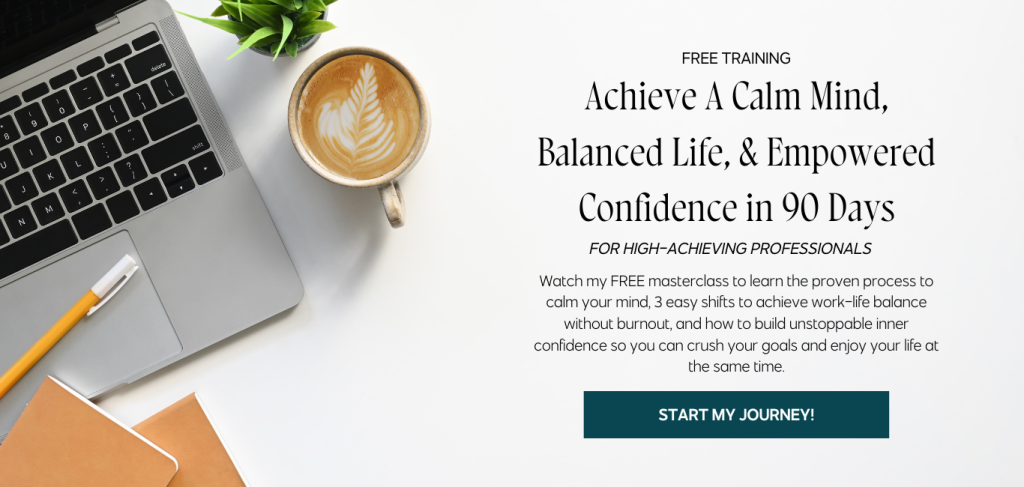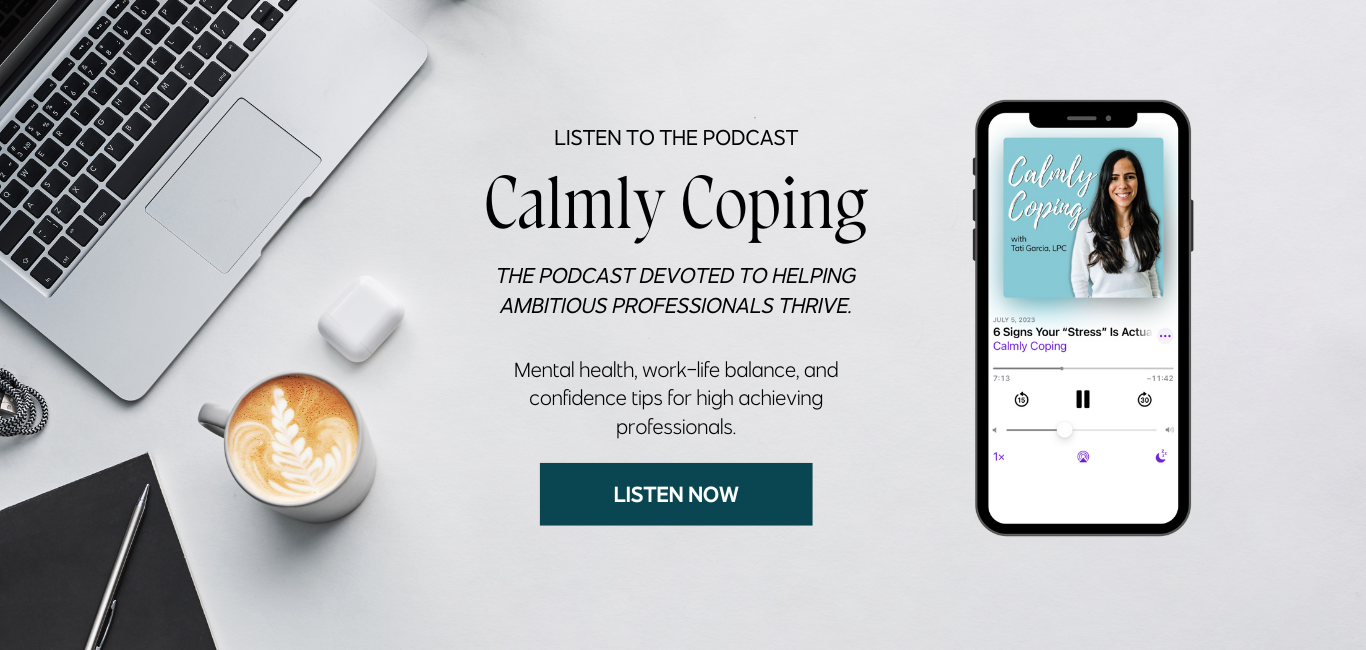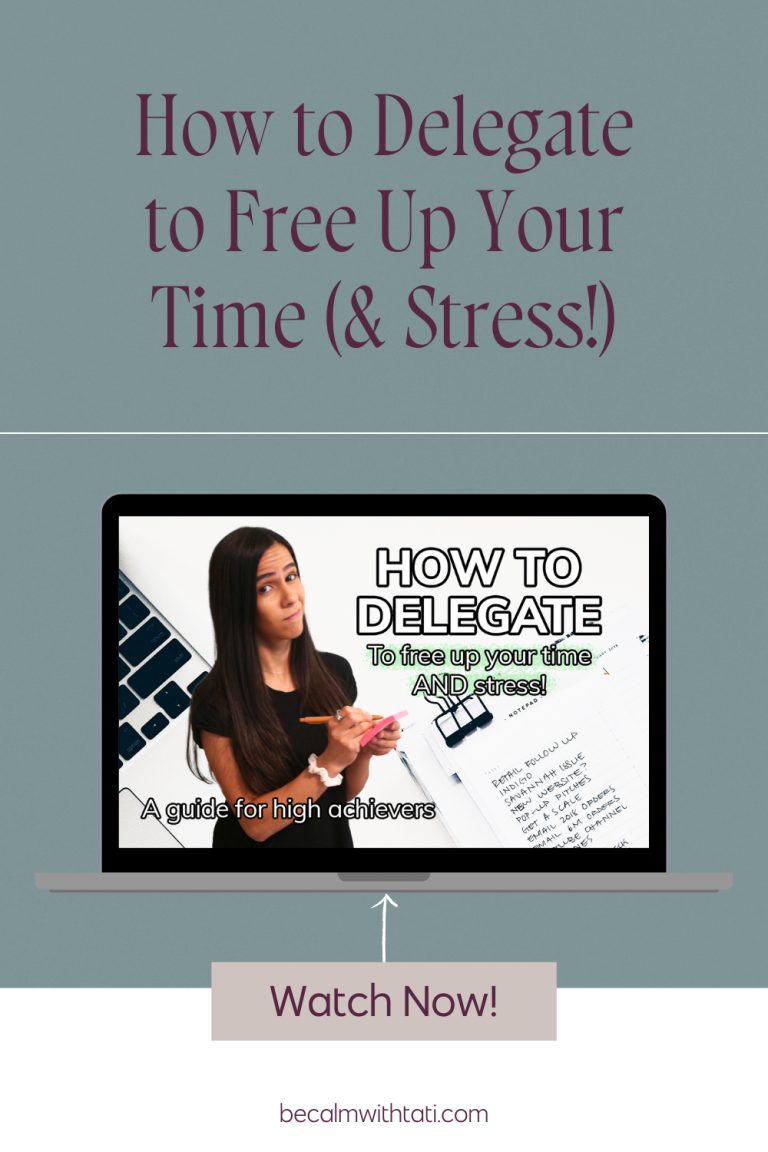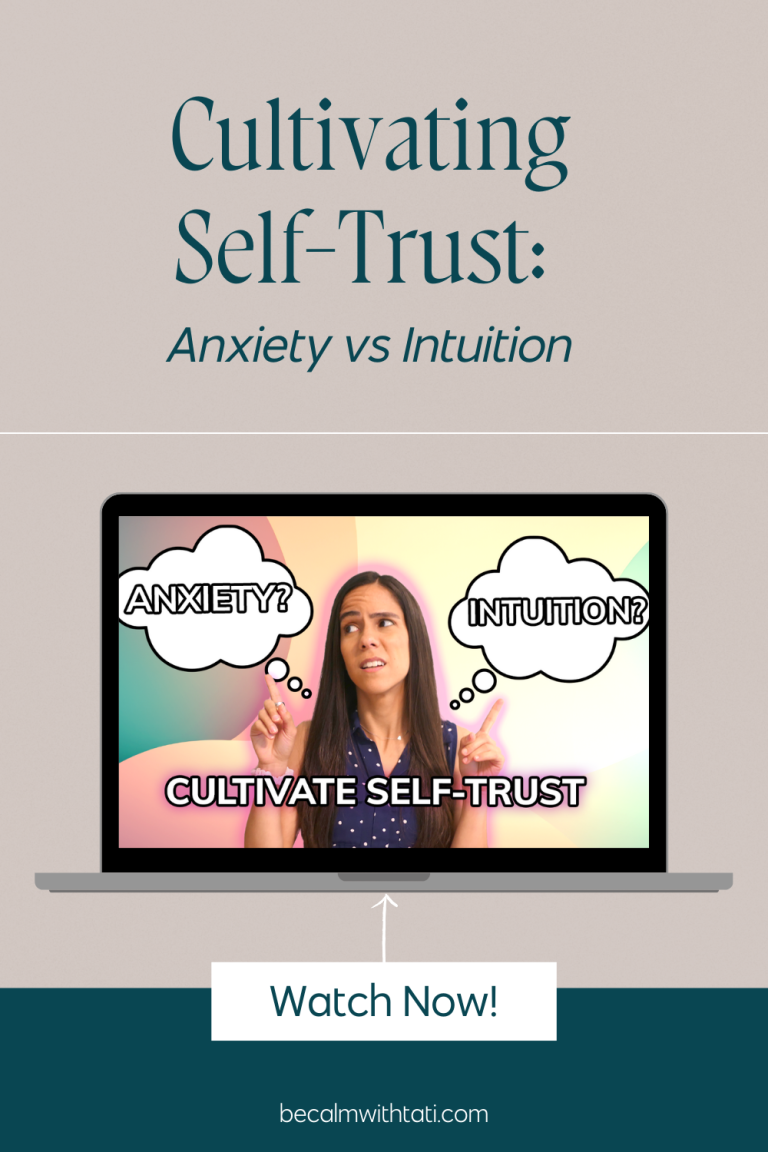Do you ever find yourself constantly busy, even when you don’t need to be? What if this constant busyness isn’t just about getting things done, but about avoiding something deeper? In this episode, we’ll explore how overworking and constant productivity can be an unconscious form of avoidance, why it feels so rewarding and addictive, and what might be underlying this behavior.
In this episode, you will learn:
- How constant busyness can be a form of avoidance
- What you’re REALLY avoiding when you are constantly busy and have difficulty relaxing
- How to break the cycle of overworking and allow yourself to rest and enjoy your life
LISTEN NOW:
🎧 CLICK HERE TO LISTEN TO CALMLY COPING WHEREVER YOU LISTEN TO PODCASTS
WATCH NOW:
📝 Take the Free High-Functioning Anxiety Quiz: HFA Quiz
🖊️ Join the waitlist for my 1:1 services: Waitlist
💬 Submit a message, question, or suggestion to the podcast: Message
FREE TRAINING: Achieve A Calm Mind, Balanced Life, & Empowered Confidence in 90 Days
If you want to learn how to take back control of your life so you can feel calmer and more confident, and learn the tools to spend your time according to what matters most to you (no matter what your schedule is like right now)…

LISTEN, REVIEW, AND SUBSCRIBE TO THE PODCAST!

INTRO/OUTRO MUSIC: Rescue Me (Instrumental) by Aussens@iter (c) copyright 2018 Licensed under a Creative Commons Attribution (3.0) license. http://dig.ccmixter.org/files/tobias_weber/57990 Ft: Copperhead
DISCLAIMER: All content here is for informational purposes only. This content does not replace the professional judgment of your own mental health provider. Please consult a licensed mental health professional for all individual questions and issues.
Interested in diving deeper to get support for high-functioning anxiety?
I offer 1:1 coaching to help high-achievers overcoming high-functioning anxiety so they can feel calmer, more present, and have improved balance in their lives. Click here if you’re interested in learning more and getting started.
Calm, Balanced, & Confident is my comprehensive A→Z self-paced course to help high-achieving professionals overcome high-functioning anxiety so they can feel calmer, balanced, and more confident without the anxiety and overwhelm. Click here to learn more and enroll today.
Looking for ongoing support and guidance with high-functioning anxiety? The Calm & Ambitious Community is the exclusive community for high achievers with high-functioning anxiety. Click here to learn more and join us today!
TRANSCRIPT:
Click to view the episode transcript.
Do you ever find yourself constantly busy even when you don’t need to be? What if this constant busyness isn’t just about getting things done, but about avoiding something deeper? In this episode, we’ll explore how overworking and constant productivity can be an unconscious form of avoidance, why it feels so rewarding and addictive, and what might be underlying this behavior.
Welcome to calmly coping. I’m your host, Tati Garcia. I’m a licensed therapist and a high functioning anxiety coach. Calmly coping is the podcast for people who struggle with anxiety and high functioning anxiety. Each Wednesday, you’ll hear informative episodes with actionable tips about decreasing anxiety, adopting a healthy mindset and managing your time and energy.
So you can live a calm and balanced life. Let’s get started. Thank you so much for tuning in. Constantly being productive and overworking can be an unconscious form of avoidance, especially in somebody who is high achieving, overachieving, or high performing. I like to refer to it as the overs. So these types of individuals will often overwork.
over prepare, over think, over you name it, because there is this constant drive, and especially in the types of individuals that I specialize in supporting, or those who are struggling with what’s known as high functioning anxiety. And so those are individuals who appear high achieving and successful on the outside, but on the inside they are struggling with anxiety and this intense fear of failure and fear of judgment or negative consequences that is often propelling them forward into doing more.
So there’s this worry often about dropping the ball, or if I don’t prepare enough, then things are going to go wrong, or I’m going to be seen as incompetent, or people are going to judge me negatively. So it’s this fear and worry and guilt that are often driving this kind of endless behavior of overreaction.
over doing things. And this often results in a lack of self care and a lack of just being able to relax and allow yourself to actually enjoy your life. But there’s this constant feeling that you need to be productive and doing more. And this also ties into the fact that oftentimes these types of individuals will attach their self love, their self care, their work.
worth or how worthy or valuable they think they are as a human to how much they are getting done. So if you feel as though you need to accomplish more or check more things on your list in order to feel like you’re good enough, or in order to avoid this feeling of I’m a lazy person, then you could be stuck in this cycle of just constantly doing, producing, performing, achieving, and not allowing yourself to actually rest, recharge, take a step back.
And do what we all need to do as humans. And by the way, if you’re somebody who is curious about high functioning anxiety, you’re not sure whether or not you have it, I have a free quiz that you can take to help you identify whether or not you have high functioning anxiety, along with the next steps that you can take to help you to manage and overcome it.
You can take this quiz by going to hfaquiz.com. And here’s the thing about being productive and constantly busy and overworking, is that it can create this temporary sense of accomplishment. Like, it feels good to check things off of your list and it feels good to get things off of your plate.
However, this is often short term. lived and then it follows with, Oh, now there’s more on my list that I need to do, or let me just get these next few things done and then I’ll be able to relax. And it kind of turns into this endless cycle that you find that you may never get the time to relax because there’s always going to be more and you’re not necessarily relishing in and celebrating the accomplishments that you are engaging in.
And here’s the thing, when you’re staying busy, it can actually help to distract you your uncomfortable thoughts or emotions maybe underneath when you find and this is something that I find a lot of clients that I help when they actually do sit down to relax. There is this inner critic that comes up like, Oh, you should be doing more or what’s wrong with you, or you’re not good enough.
And so staying busy helps you to avoid confronting those thoughts, which can be really uncomfortable and disconcerting. And it also can be the underlying emotions of the guilt. or the worry or the feeling down and being hard on yourself that can be underneath this productivity that you’re kind of just covering up with these accomplishments of checking things off a list.
So I touched on this a little bit, but what are you really avoiding when you’re in this place of constant productivity, it’s oftentimes fear, anxiety, guilt, or any other uncomfortable emotions that are under the surface. Here’s the thing. We, many of us, I know that I wasn’t growing up, weren’t taught the skills in order to manage our emotions, in order to process and work through things.
And this is an essential skill of being human, because emotions are something that are inescapable. We can’t just avoid them and say, I don’t want to feel this way, and brush it under the rug, and then have there be no consequences. Our emotions are something that need to be recognized and worked through.
Otherwise, if they’re not, they’re going to continue unconsciously affecting our behaviors, our thoughts, our urges, and everything else throughout the day without you even recognizing it. And that’s when you get stuck in this. place of autopilot and just continuing to do things because you’re being driven by your emotions without you even recognizing it.
So increasing your emotional awareness and intelligence is a huge and impactful skill, especially if you’re somebody who wants to actually choose what you’re doing in your life, who doesn’t want to be driven by these constant urges that might have been conditioned in childhood or past experiences, but are no longer helpful or beneficial for you.
So it could be the fear of failure, the fear of judgment from others, the fear of not meeting expectations. And when you’re staying busy, you’re avoiding this, you’re kind of keeping this at bay because you’re covering it up with a bandaid in the sense that, all right, I’m accomplishing more. I’m getting things done.
That means I’m not lazy. That means I’m not going to fail. That means that people aren’t going to judge me negatively, but in reality, you are continually judging yourself. Negatively, you are continually in this place where you’re feeling fearful and anxious and that’s going to continue under the surface until eventually it boils over and it just becomes too much and you have to take a step back and you have to turn off the on switch and actually explore and recognize what is going on under the surface.
in these potential underlying causes could be a harsh inner critic. I mentioned this before, so maybe you have internalized this voice of being really hard on yourself and putting a lot of pressure on yourself and saying that you’re not allowed to take a break, you constantly have to be busy, you’re a bad person if you don’t check these things off the list, whatever it is that your mind is telling you.
These are things that we often internalize from parents, caregivers, teachers, coaches, anybody, especially in your earlier life experience. that we can kind of take on these voices and use them as ways of motivating ourselves when in reality they just make us feel worse. Maybe it’s past trauma that you’ve experienced that is also under the surface that hasn’t been truly processed or resolved.
And if it’s something that you’re, uh, avoiding, wanting to talk about or think about, that is often a sign even more that it could be affecting you in your day to day and when it can be beneficial to get the support of a therapist to help you process and work through that trauma. Even if it’s something that happened decades ago or a long time ago, it can still be affecting you in the present and negatively impacting your ability to function and to take the proper care of yourself.
Or maybe you’re avoiding the things that happen outside of work. Maybe it’s stress in your relationship or your family or your friendships or the things that you have to confront when you’re not being busy, when you’re not working, especially if you’re somebody who is staying late at work. and constantly doing chores to avoid, and this might not be a conscious thing, but maybe unconsciously avoid interactions with your partner or family members or friends, then this could be a potential sign that maybe there’s something like some sort of stress or difficulty that you could be avoiding by continuing to stay busy.
This could also be financial stress, whether it is the stress of I don’t have enough money, so I need to keep working and this endless pressure to keep doing more. Or maybe it’s on the other side of things where you are somebody who is actually making a lot of money and you feel guilt for making this amount of money and so you feel like you need to work more in order to justify making this additional amount of money.
Maybe you’re also somebody who is struggling with low self worth and because of that, you feel as though you need to prove yourself by doing more work or by getting more things done. Prove that you are a productive person or prove that you are a qualified or competent enough person and this is driving your desire to constantly be doing more, pushing yourself harder.
Or maybe it’s some combination of multiple things. And I’m sure there’s things that I missed. If you find that maybe there’s something else that could be driving this desire to constantly be busy, then this can be something for you to journal on and reflect on what happens when I stop or slow down, what happens when I’m not checking things off of a list.
And that’s kind of the next step is recognizing the pattern. Asking yourself, do I feel anxious all the time? When I’m not working, do I feel guilty when I’m not working or what emotions come up when you try to take a break or what happened if you took a break and let go of your to do list? What does your mind come up with?
And I’m asking it in this way, because oftentimes our minds can exaggerate the negative consequences that occur, especially when it’s coming from a place of fear and anxiety. So asking yourself personally, Okay. what will happen if I stop or slow down or if I let go of constantly doing and constantly being productive.
And this can give you clues as to what is driving that within you. And once you have recognized this pattern, then you can, you know, journaling is a great first step and this can help you to become more aware of what’s underneath that. If you’re looking for more one on one support and guidance, this is something that I help my clients with.
You can learn more by clicking on the link in the description to work with me and learn more about my coaching and therapy services. Or you can meet with a therapist in your local area. But I encourage you to start by just creating small pockets and moments of stillness in your day. So maybe it’s just taking out five minutes to rest without any stress.
So I want to talk about doing work without the pressure of the list on you and just doing something that you genuinely enjoy. That maybe you wish you had more time to do, but you don’t because you’re constantly in this place of productivity. And taking five minutes is a simple thing that we can do.
Maybe you want to set an alarm for that during your day. And as you gradually ramp up, maybe adding more and more of these small breaks. And the important part is when you are taking these breaks, noticing, all right, how do I feel? Am I putting pressure on myself? What’s going on here? And it’s not about judging this or criticizing yourself for this because that’s just going to create more negativity that you’re placing on top of yourself.
It’s about being aware of it, non judgmentally and compassionately, so that you can recognize the pattern, recognize what is at the root, and then address it. And so if it is self criticism, and this is the next step, where you are addressing the underlying causes. So if it’s self criticism, practicing and learning the skills of self compassion, noticing that critic when it comes up.
This is something that I dealt with a lot in the past, still comes up from time to time, where there’s this guilt of, okay, I’m taking. a day off or maybe I had something on my calendar and I’m really not feeling up to it and if I were working for somebody else in the past I would have taken a personal day but now that I’m self employed it feels like this is hanging over me and so I’m being hard on myself like, I should be working or I should be doing more, what’s wrong with you, you’re so lazy, all of those criticisms that come up even though I know and I don’t consciously agree with these thoughts.
It’s about recognizing for me what tends to come up so that I can notice it and acknowledge it and then say, All right, I know that you’re trying to help me get things done, but I don’t need you and it’s okay for me to relax and I need to do this in order to return and do even better work once I do rest and recharge.
This can also look like increasing your emotional awareness. Starting to label, name, and then actually work through your emotions. Notice what they feel like. What are they trying to tell you? What’s under the surface there? Also, working through trauma. This can be really important to get the support of a qualified trauma informed therapist to help you to work through anything that could still be influencing you in the present.
And let’s see if it’s relationship stress, financial stress, really facing those things head on. Not just continuing to avoid them and brush them under the rug, but maybe that looks like having conversations or making plans or doing the numbers with finances and recognizing that, okay, I’m maybe, I felt like, This stress and this pressure to continue to work and do more, but when I do the numbers, I’m okay and I’m making it and I don’t need to put this pressure on myself because it’s not making me any more money.
It’s just causing me more stress. So kind of addressing what is it for you that is getting you in this place and how can you address that specific underlying cause and recognizing, above all, that Productivity is not a measure of your worth. You do not need to do things. You do not need to check things off a list to be a good person, to be a good enough person, to be a valuable or worthy person.
You are worthy exactly as you are. So I encourage you to start to bring this awareness to your own life. If you’re somebody who is in this place of constant productivity and overworking, if you’re interested in learning more about high functioning anxiety, don’t forget about that free quiz at hfaquiz.com.
And remember it is okay to slow down and real growth often comes from addressing the emotions that we’d rather avoid. It can feel uncomfortable and difficult in the moment, but this is a process of healing and working through things so that you can grow even stronger in the end. If you have any comments, questions, or podcast, you can submit them to me by going to CalmlyCoping.com/message. And while you wait for next week’s episode, I have other episodes about calming your mind, improving work life balance, and feeling more confident from within. Thank you so much for tuning in today. Until next time, be calm. Thanks so much for listening. If you like what you heard, please share this episode with a friend and please subscribe and leave me a review on iTunes.
Also, remember to check me out online at CalmlyCoping.com and connect with me on Instagram @TatianaGLPC. All content here is for informational purposes only. This content does not replace the professional judgment of your own mental health provider. Please consult a licensed mental health professional for all individual questions and issues.
Till next time, I’m Tati, and this has been Calmly Coping.


Until next time…













